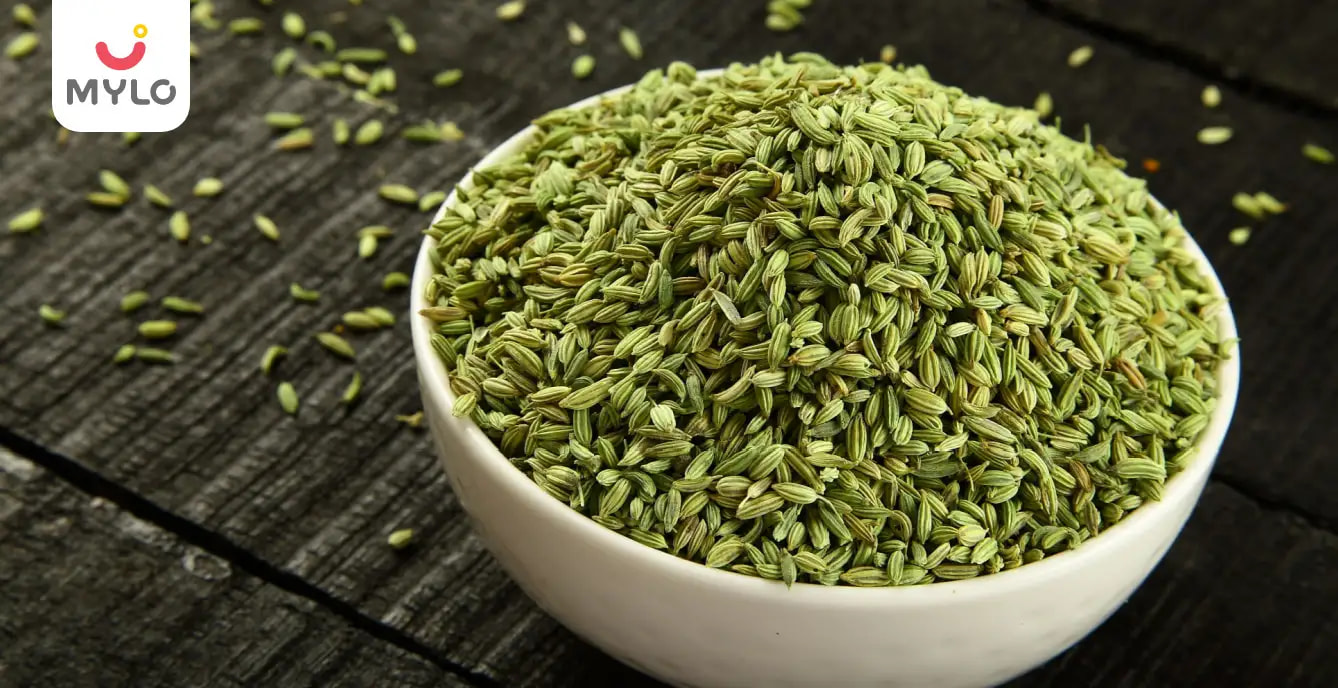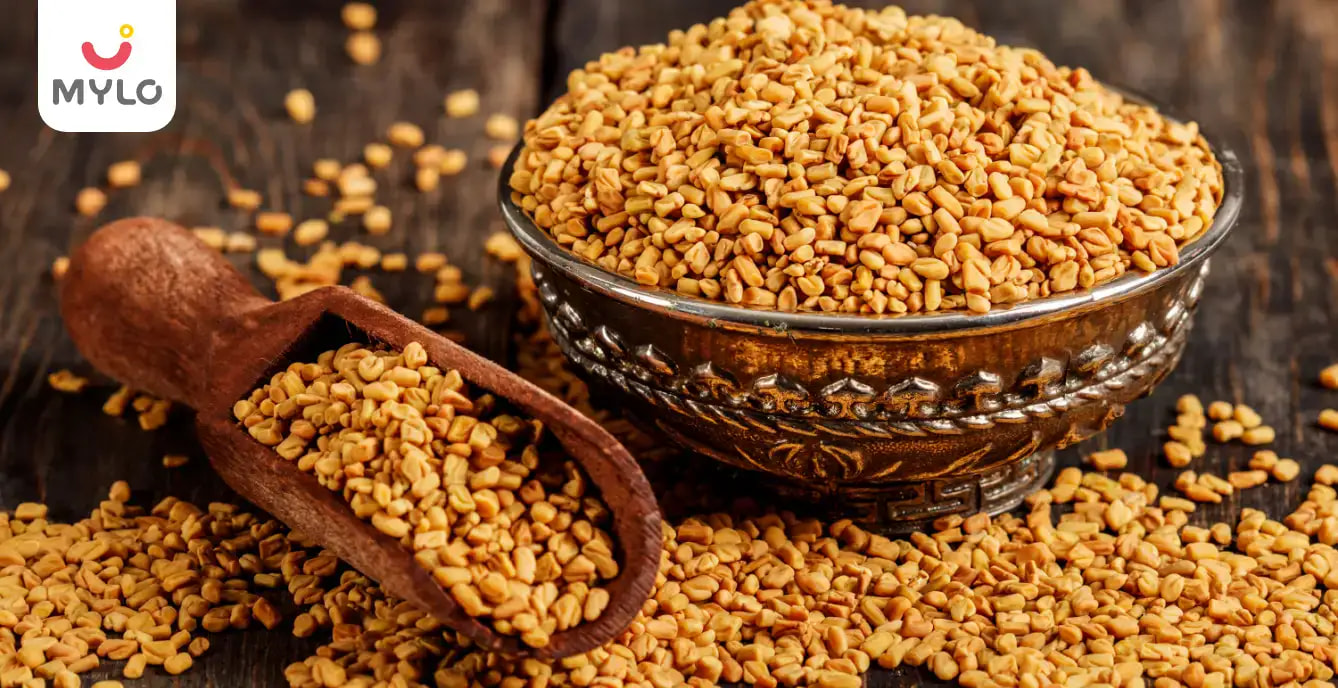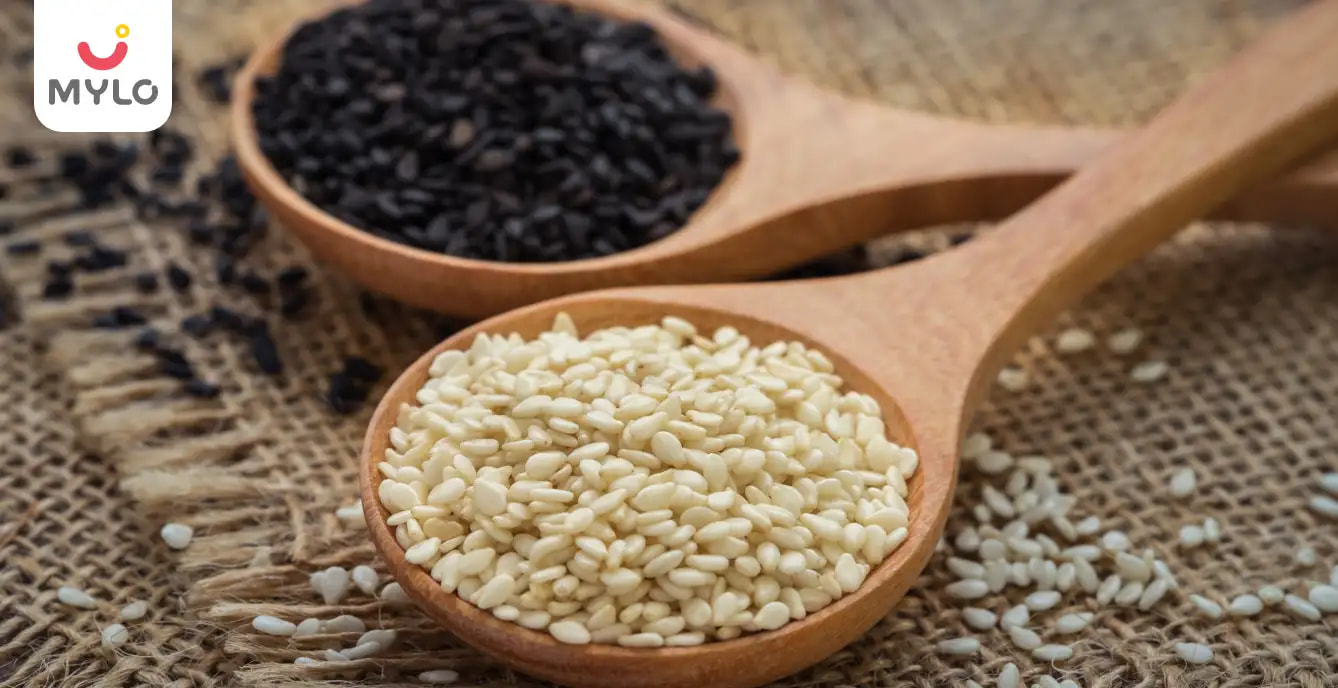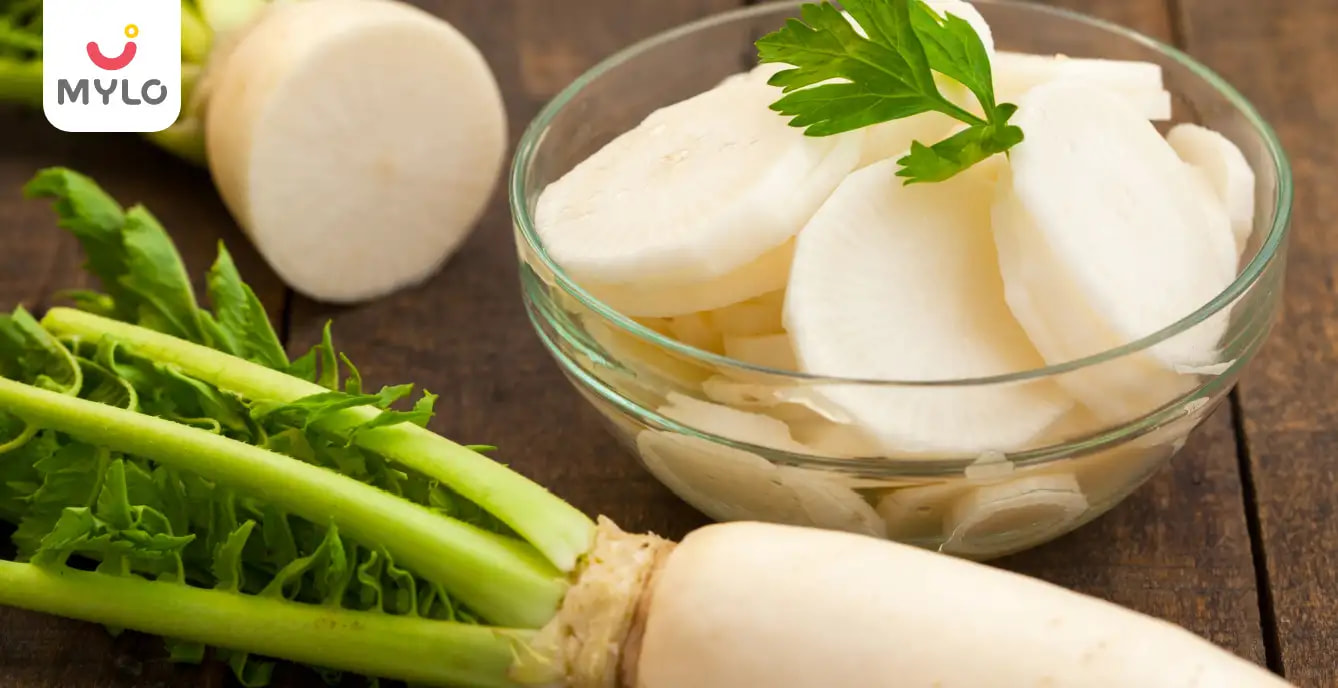Home

Fennel Seeds or Saunf in Pregnancy: Benefits, Risks & Nutritional Value
In this Article

Fennel Seeds or Saunf in Pregnancy: Benefits, Risks & Nutritional Value
Updated on 3 November 2023



Medically Reviewed by
Mayurakshi Kundu
diabetes, hypertension, obesity and also looked into pregnancy, lactation cases - Masters in Food and Nutrition
View Profile

During pregnancy, a woman's body undergoes various changes which may cause her some discomfort. To alleviate discomforts like bloating and indigestion, natural remedies and home cures can be beneficial. Fennel seeds (saunf) are a commonly used kitchen ingredient that can provide relief to pregnant women. However, some may be hesitant to consume saunf in pregnancy. This article discusses the benefits, risks, and effects of fennel seeds in pregnancy to help pregnant women make an informed decision.
What are fennel seeds?
The herb fennel, first discovered in Europe, has seeds, called fennel seeds, that have a flavor and aroma. They are green or brown when tender and eventually turn a dull grey. The plant has fluffy leaves and is a member of the parsley family. The fennel plant, frequently found in kitchens, is well-known for its therapeutic benefits. In India, commonly called "saunf," it is used in cooking, and most people use it as a mouth freshener. It is believed to relieve dental pain and gum problems and has many other health advantages, such as promoting digestion.
Nutritional value of fennel seeds
The USDA provides the following nutrition value of fennel seeds for 1 cup (87g) of sliced fennel.
- Calories: 27
- Fat: 0.2g
- Sodium: 45mg
- Carbohydrates: 6.3g
- Fiber: 2.7g
- Sugars: 3.4g
- Protein: 1.1g
You may also like: Sesame Seeds in Pregnancy: Benefits, Effects & Nutritional Value
Is it safe to consume saunf during pregnancy?
Yes, it's safe to consume fennel seeds in pregnancy in moderation. Consuming fennel seeds in small amounts can help with common pregnancy issues such as nausea, bloating, and dental caries. Fennel seeds are also known to stimulate bile flow, which can alleviate cramps.
However, pregnant women should avoid consuming fennel seeds in excess amounts as they may cause vaginal bleeding that could lead to miscarriage. Fennel seeds can also slow blood clotting and lead to dry and sensitive skin, so those with bleeding disorders and sensitive skin should consume them cautiously.
During pregnancy, one can sprinkle a few of these seeds—say, around a teaspoon—into the food. Based on specific health requirements, a pregnant woman can consult the doctor to understand how much saunf in pregnancy may be ingested. As per the USDA guidelines, adults are advised to consume approximately 2 to 3 grams or one tablespoon of fennel seeds per day as the recommended daily intake during pregnancy.
Benefits of saunf during pregnancy
Here are some of the most common benefits of consuming fennel seeds during pregnancy:
1. Accelerates digestion
Anethole found in fennel seeds can aid in relieving digestive muscle tension, promoting healthy digestion, and mitigating indigestion, gas, and other digestive problems. By relaxing the muscles in the digestive tract, saunf can stimulate bile flow and provide relief from flatulence and bloating during pregnancy.
2. Regulates blood sugar
Consuming fennel seeds during pregnancy can also help regulate the blood sugar levels during pregnancy by reducing the absorption of glucose in the intestines. As a result, women at risk of gestational diabetes or with it can maintain their blood sugar levels by consuming little fennel regularly.
3. Prevents constipation
Fennel seeds are also a great source of dietary fibre. A tablespoon of saunf is said to contain 2.9 gm of fibre. This makes fennel seeds an effective ingredient in preventing and relieving constipation during pregnancy.
4. Rich in antioxidants
Fennel seeds are also rich in antioxidants such as flavonoids, phenolic compounds and volatile oils. These antioxidants can help fight free radicals and minimise the damage caused by them.
5. Combats morning sickness
Nausea and vomiting are frequent woes of pregnant women in early pregnancy due to which they may lose their appetite. Consuming fennel seeds in pregnancy can help boost the appetite and combat morning sickness by reducing gas and heartburn.
Side effects of fennel seeds consumption during pregnancy
While there are many benefits of consuming saunf, it's important to know its side effects as well:
1. Blood-thinning properties
Fennel seeds can affect the blood's capacity to clot, thereby slowing down the clotting process. Therefore, it is best to avoid saunf during pregnancy if someone suffers from a bleeding issue, especially if prone to wounds and bleeding.
2. Increases dryness and sensitivity
Consuming fennel seeds might cause dryness and heighten sensitivity in the skin. Pregnant women must avoid fennel seeds if they have sensitive skin. Many gestating women consume fennel seeds for fair baby, but no scientific evidence supports that.
3. May trigger contractions
Fennel is known to have antispasmodic and anti-inflammatory qualities that stimulate the uterus and cause early contractions. While pregnant, consuming fennel in moderation will not harm the fetus nor trigger preterm contractions.
Risks of fennel seeds in pregnancy
Consuming fennel seeds during pregnancy may have some potential risks. Fennel seeds can affect the blood's ability to clot, make the skin drier, and stimulate menstrual flow. This can increase the risk of miscarriage in early pregnancy. Pregnant women with bleeding disorders or sensitive skin should avoid consuming fennel seeds. However, consuming fennel in moderation will not harm the fetus nor trigger preterm contractions, and fennel seeds are harmless in small amounts with no known harmful effects on the mother or the unborn child.
How can fennel seeds be added to a pregnancy diet?
There are a few ways pregnant women can eat fennel seeds after doctor consultations. Fennel seeds have a pleasant scent and a faint sweetness. When added to meals, they serve as a flavoring ingredient and give the food a delicate flavor. Additionally, a pregnant woman can use them in tea or eat them raw after meals. Before including saunf in your pregnancy diet, it is essential to consult a doctor or nutritionist. You can add fennel powder to curd buttermilk or while making tea. Additionally Fennel is an essential ingredient of some of the Indian dishes like dry okra (bhindi ki sabzi), potato curry ( Aaloo ki sabzi), dal and many more.
Does eating fennel seeds cause a miscarriage?
Excess consumption of fennel seeds can cause a miscarriage. This is because fennel seeds have natural emmenagogue properties that can trigger the menstrual cycle and lead to vaginal bleeding, which may cause a miscarriage. However, consuming fennel seeds in moderation during pregnancy is safe and offers several health benefits, including aiding digestion, reducing inflammation, and promoting lactation.
Pregnant women should consult a doctor about the appropriate amount to consume during pregnancy, especially if they have a bleeding disorder or sensitive skin.
You may also like: Hing (Asafoetida) During Pregnancy: Risks, Benefits & Precautions
Closing Thoughts
In conclusion, it's safe to consume fennel seeds or saunf in pregnancy as long as you eat them in moderation. It is always advisable to consult a healthcare professional before adding any new food to your diet during pregnancy. Overall, consuming fennel seeds in pregnancy as part of a balanced diet can help support a healthy pregnancy.
References
1. Illamola SM, Amaeze OU, Krepkova LV, Birnbaum AK, Karanam A, Job KM, Bortnikova VV, Sherwin CMT, Enioutina EY. (2020). Use of Herbal Medicine by Pregnant Women: What Physicians Need to Know. Front Pharmacol.
2. Liu H, Li J, Lin S, Liu T, Zheng C. (2021). Effects of dietary fennel (Foeniculum vulgare Mill.) seed powder supplementation on growth performance, nutrient digestibility, small intestinal morphology, and carcass traits of broilers. PeerJ.
Tags





Medically Reviewed by
Mayurakshi Kundu
diabetes, hypertension, obesity and also looked into pregnancy, lactation cases - Masters in Food and Nutrition
View Profile


Written by
Sanju Rathi
A Postgraduate in English Literature and a professional diploma holder in Interior Design and Display, Sanju started her career as English TGT. Always interested in writing, shetook to freelance writing to pursue her passion side by side. As a content specialist, She is actively producing and providing content in every possible niche.
Read MoreGet baby's diet chart, and growth tips

RECENTLY PUBLISHED ARTICLES
our most recent articles

Diet & Nutrition
গর্ভাবস্থায় আলুবোখরা: উপকারিতা ও ঝুঁকি | Prunes During Pregnancy: Benefits & Risks in Bengali

Diet & Nutrition
গর্ভাবস্থায় হিং | ঝুঁকি, সুবিধা এবং অন্যান্য চিকিৎসা | Hing During Pregnancy | Risks, Benefits & Other Treatments in Bengali

Women Specific Issues
স্তনের উপর সাদা দাগ: লক্ষণ, কারণ এবং চিকিৎসা | White Spots on Nipple: Causes, Symptoms, and Treatments in Bengali

Diet & Nutrition
গর্ভাবস্থায় পোহা: উপকারিতা, ধরণ এবং রেসিপি | Poha During Pregnancy: Benefits, Types & Recipes in Bengali

Diet & Nutrition
গর্ভাবস্থায় মাছ: উপকারিতা এবং ঝুঁকি | Fish In Pregnancy: Benefits and Risks in Bengali

Diet & Nutrition
গর্ভাবস্থায় রেড ওয়াইন: পার্শ্ব প্রতিক্রিয়া এবং নির্দেশিকা | Red Wine During Pregnancy: Side Effects & Guidelines in Bengali
- ইনার থাই চ্যাফিং: কারণ, উপসর্গ এবং চিকিৎসা | Inner Thigh Chafing: Causes, Symptoms & Treatment in Bengali
- গর্ভাবস্থায় ব্রাউন রাইস: উপকারিতা ও সতর্কতা | Brown Rice During Pregnancy: Benefits & Precautions in Bengali
- Velamentous Cord Insertion - Precautions, Results & Safety
- Unlock the Secret to Flawless Skin: 7 Must-Have Qualities in a Face Serum
- Unlock the Secret to Radiant Skin: How Vitamin C Serum Can Transform Your Complexion
- Gender No Bar: 10 Reasons Why Everyone Needs a Body Lotion
- Unlock the Secret to Radiant Skin How to Choose the Perfect Body Lotion for Your Skin Type
- Top 10 Reasons to Apply a Body Lotion After Every Bath
- Communication in Toddlers: Milestones & Activities
- How to Improve Vocabulary for Toddlers?
- A Comprehensive Guide to Understanding Placenta Accreta
- Vulvovaginitis in Toddlers Causes, Symptoms and Treatment
- A Comprehensive Guide to Understanding Cerebral Palsy in Children
- Bitter Taste in Mouth During Pregnancy: Understanding the Causes and Remedies


AWARDS AND RECOGNITION

Mylo wins Forbes D2C Disruptor award

Mylo wins The Economic Times Promising Brands 2022
AS SEEN IN

- Mylo Care: Effective and science-backed personal care and wellness solutions for a joyful you.
- Mylo Baby: Science-backed, gentle and effective personal care & hygiene range for your little one.
- Mylo Community: Trusted and empathetic community of 10mn+ parents and experts.
Product Categories
baby carrier | baby soap | baby wipes | stretch marks cream | baby cream | baby shampoo | baby massage oil | baby hair oil | stretch marks oil | baby body wash | baby powder | baby lotion | diaper rash cream | newborn diapers | teether | baby kajal | baby diapers | cloth diapers |








